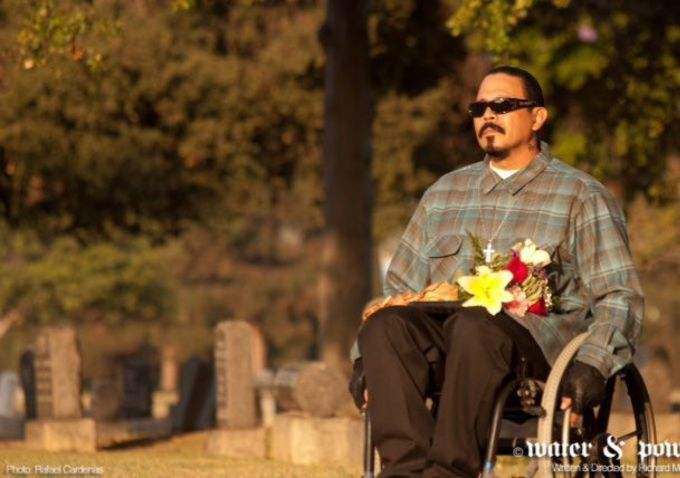 The story of Water and Power takes place one night in the city of Los Angeles. The performances of Enrique Murciano as Water, Nicholas Gonzalez as Power and Emilio Rivera as Norte Sur are powerful even though the advancement of the storyline was unnecessarily complex and it required thoughtful viewing. The two brothers were raised by their father, a Department of Water and Power employee. The twin boys were nicknamed Water and Power and raised to believe they could not exist without each other. Their father prophesized that the boys would one day decide where the water and power would go in the city of Los Angeles. There are many notable symbols, intriguing dialogue and messages throughout the film as well as stereotypes.
The story of Water and Power takes place one night in the city of Los Angeles. The performances of Enrique Murciano as Water, Nicholas Gonzalez as Power and Emilio Rivera as Norte Sur are powerful even though the advancement of the storyline was unnecessarily complex and it required thoughtful viewing. The two brothers were raised by their father, a Department of Water and Power employee. The twin boys were nicknamed Water and Power and raised to believe they could not exist without each other. Their father prophesized that the boys would one day decide where the water and power would go in the city of Los Angeles. There are many notable symbols, intriguing dialogue and messages throughout the film as well as stereotypes.
This film explores the life of two Chicanos that have become “successful” in the city of the angels. Water, the senator is serving his community and plans to provide jobs and a green space in the city near the river. Power is a ranking officer in the LAPD. He is surrounded by and involved in LAPD corruption. This fact is made plan as LAPD is portrayed as a gang riding in a police vehicle, drinking, smoking weed and displaying symbols of profanity. The story takes place one night late in the City of Los Angeles. Power is held up in a seedy motel room with drugs, guns, the LAPD murder book and a demonic image on a television set that indicates that programming has ended for the night. He is visited by Norte/Sur who is in a wheel chair and his brother, Water. Power has crossed the line and Water and Norte/Sur try to circumvent Power’s demise. This film is about men only and women are noticeably absent from the main storyline. The portrayal of women is suspect as women appear as strippers, foul mouthed and more masculine than feminine. Although the storyline is dramatic there are comedic scenes and elements of irony throughout. Mr. Norte/Sur is referred to as “MapQuest” as he carries out a number of errands all over the county in his wheelchair without a car.
There are many shots of scenery special to Angelenos only. As a matter of fact there is a line in the movie that says “L.A. is not for everyone”. The film displays a wall mural that says “We are not a minority”. This is a powerful message for me because people of color always have a label of less than and I myself grew up with this message and need to make a conscious effort to avoid this reference when speaking of people of color. There is also a line that is repeated throughout the film that recognizes the uncertainty of power in the city and the twists and turns in the storyline. The line is “Nothing is concrete in Los Angeles accept the river”.
There are many symbols to be recognized in the film and I invite the reader to provide their opinion on the meaning. There is a male deer that appears in the most unlikely places. He appears in city traffic, on a painting in the home where Power shoots Escobar, the deer also appears as a stuffed head mount in Turnball’s apartment and as a tattoo on Power’s chest. The number 13 appears on television for Channel 13; the number B13 appears on the back of a police vehicle and the number 13 is tattooed on Power’s chest. These symbols clearly mean something. Each scene is packed with props, dialogue and acting that add to the story.
The story of Water and Power is intriguing and different as the Chicano brothers are successful and are assimilated into the mainstream culture. Ironically, in that culture, corruption is the key to success.
Water and Power both carry out the stereotype of the Latino machismo. However, unlike the stereotypical gang member or drug dealer, these men are successful, achieving the American dream. However, eventually they have to succumb to the great white savior, Turnball. The stereotype of the “white gaze” is evident. In a film that is literally and figuratively dark, the character of Turnball is literally a bright light. If you missed this stark contrast, you cannot miss the ultimate humiliation that Water endures while he literally washes Turnball’s feet. This behavior pays homage to “what America’s mainstream expects from minorities” discussed in the article, Who is Exactly Living La Vida Loca?
